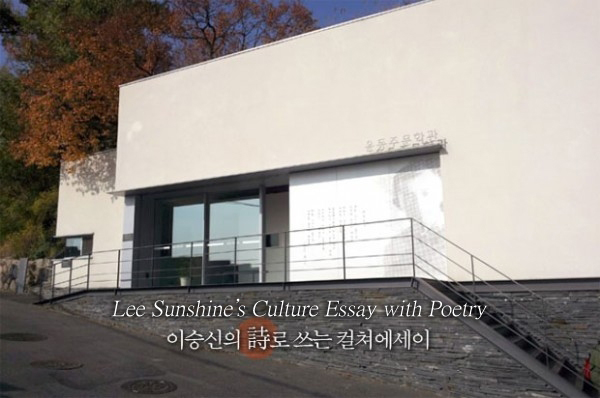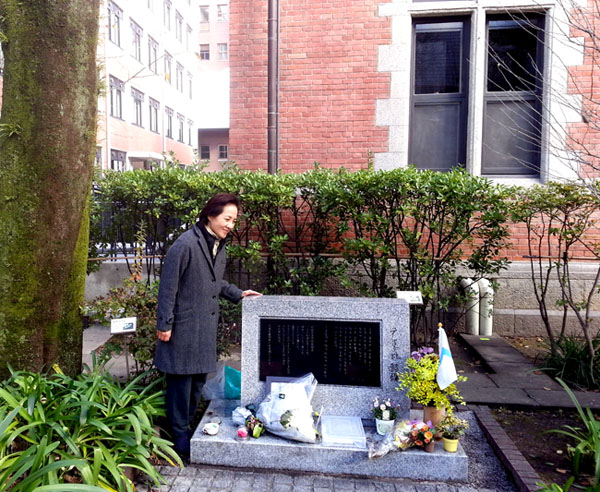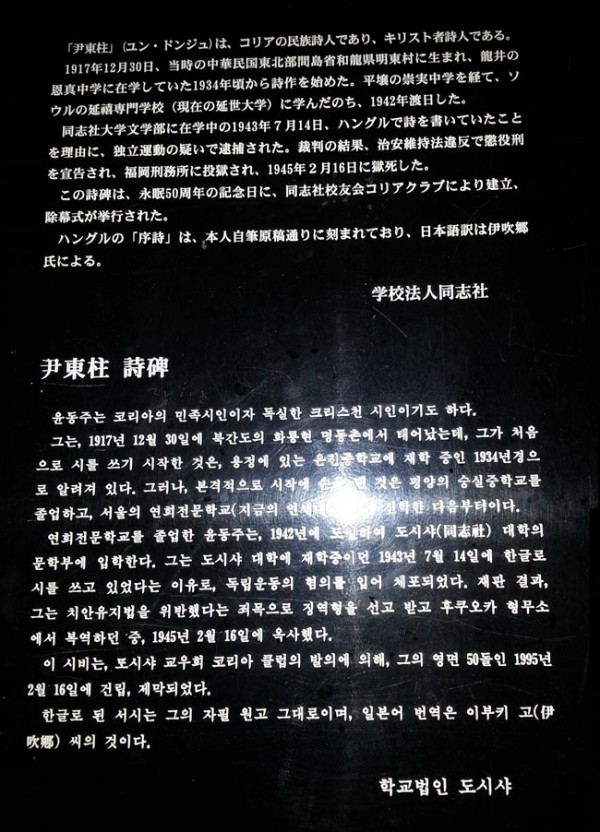
Yun Dong-ju Museum of Literature in Buam-dong, Jongno-ku, Seoul 1 29 2014
The Heavens, the Winds, the Stars, and Poetry
It is very pleasant to walk along a path from my house to Buam-dong. Furthermore, there is the Museum of Literature dedicated to my favorite poet, Yun Dong-ju (1917-1945). Once climbing up the stairs carved with his easy and lyrical poems, one can find the Hill of Yun Dong-ju, on top of which a monument of his poetry stands.
Despite the museum’s petite size after observing the well with which he used to look at himself in Manchuria and his handwritten manuscripts in the first room, appreciating the blue sky and the wind in the second space and sitting in the last silent room–which seems like a dim-lit prison cell–I become solemn, contemplating the poet, his time, his life, and his thoughts. I start to admire him and how he was thinking about his country and his people at a young age and expressing his speculations about the universe in poetry.
Ever since my book of poetry has been published in Japan and Korea, some Japanese readers have been visiting me from time to time with my book in their hands. Appreciating their effort to come a long way to visit, I used to guide them first to the House of Poet Son Ho-yun and then suggest a walk passing through Gyeongbok High school, Cheong Wa Dae (The Blue House, the Korean presidential residence), Chilgung (the Seven Shrines) and a hill with a view of the city on the left side that eventually leads to the Yun Dong-ju Museum of Literature. When they seem to understand the video in Korean without subtitles I realize once again the power of literature communicating mind to mind.
As the rumor about the walking path got around from those who were moved by my love of literature, I got to host an event several times under the title ‘A Walk with Poet Lee Sunshine’
At the end of last year, guided by Professor Nakai Akira, president of the T. S. Elliot society of Japan, I paid a visit to a poetic tablet of Yun Dong-ju at Doshisha University where the poet attended.
This Christian university with a long history consists of some beautiful red-brick buildings, such as an old chapel and the main hall. It was known to us as a school where our celebrities like Yun Dong-ju and Chung Ji-yong studied. Recently it became more famous as a location for the NHK TV historical drama Yae no Sakura (An Eightfold Cherry Blossom). It was founded by Niijima Jō, who studied at Phillips Academy, Amherst College, and Andover Theological Seminary in the United States. He had to arrive in the United States by ship, rather illegally, for his visa to America had been turned down by the Japanese government due to his being against the Meiji Restoration. Incidentally, the life story of his wife Niijima Yae, who also fought against the Meiji Restoration, has been vividly depicted in a novel and more recently, as a TV show. She is now often referred to as ‘Joan of Arc of Japan’
Right next to the old chapel, the poetic tablet of Yun Don-ju occupies a good location, facing another poetic tablet of Chung Ji-yong, the author of Korea’s beloved poem Hyang-su (Nostalgia). Even though those tablets look rather small and they were built by the Korean alumni association, they do not look lonely as they have each other. They made me think about the two poets who must have been carrying the poems in their thoughts, longing for their homeland from far away over the sea. I picture the moments when today’s elite Japanese students would stop by for a bit to think about our history in the past through these poets.
Yun Dong-Ju, the poet who was born into the Japanese colonial period contemplating human life and suffering in the midst of a dark and poor livelihood, tormented by the harsh reality of his country, expressed his devastated heart in moderate and succinct poems. He leads us to take some time for introspection.
Counting the starts at Night, Self-Portrait, Another Homeland and Easily written Poem. His boundlessly kind and pure mind found in these poems makes us become sincere.
As is often said, the more miserable the past of a successful man the more beautiful, he could not see any of his poems getting published in his time. He was sent to jail as a political offender for writing in Korean and died at the age of twenty-seven in a cold prison cell in Fukuoka. His innocent soul faced such a miserable death and yet, he became a beloved poet of this country.
Although he passed away only a few months before the independence of his motherland without witnessing any spectacular reversal of his life, his spirit which left us eternal innocence as his legacy, will be more valued as time goes by.
Prologue
May I look up into the heavens until the day I die
Without a bit of shame
From even the wind rustling the leaves
I have suffered
With the singing heart of the stars
I shall love all that is to die
And the road given me
I shall walk
Tonight also, the stars are touched by the wind

Poem monument of Yun Dong-ju next to a chapel at Doshisha University in Kyoto






